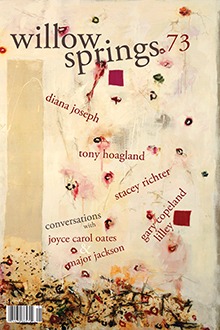
About Joseph Millar
Joseph Millar’s first collection, Overtime (2001) was a finalist for the Oregon Book Award. A second collection, Fortune, appeared in 2007. Millar grew up in Pennsylvania, attended Johns Hopkins University, and spent 25 years in the San Francisco Bay Area working at a variety of jobs, from telephone repairman to commercial fisherman. It would be two decades before he returned to poetry. His poems-stark, clean, unsparing-record the narrative of a life fully lived among fathers, sons, brothers, daughters, weddings and divorces, men and women. His work has won fellowships from the National Endowment for the Arts and a 2008 Pushcart Prize, and has appeared in such magazines as DoubleTake, TriQuarterly, The Southern Review, APR, and Ploughshares. In 1997 he gave up his job as a telephone installation foreman to try his hand at teaching. His most recent collection is Blue Rust(2012, Carnegie Mellon). He teaches in Pacific University’s low-residency MFA and lives in Raleigh, North Carolina.
A Profile of the Author
Notes on Two Poems
I once worked as a surveyor’s helper with a man who’d gone to high school with Antioch, California’s Mitchell brothers, who had their own studio and their own chain of movie houses, and whose O’Farrell Theatre still operates in San Francisco’s Polk Gulch. The Mitchells’ rise to success came to an end when Jim shot Artie to death in 1985. I wrote a poem for them-I still think they were an American phenomenon. My friend from the survey crew told me stories of the way they had to defend their turf and the way they had to scuffle. Most of their henchmen were ex-high school pals from Antioch, a small town up in the Sacramento Delta. The great Baltimore Colts lineman Gino Marchetti, who played with Unitas and Lenny Moore, also came from there. My friend was proud to have known the Mitchells.
Anyway, this led me into further study of porn stars, their lives and their ways of survival. I found that many of them live in the LA suburb of Van Nuys and that many of them (including the actor John Holmes, mentioned in the poem) were addicts. And that there’s quite a high rate of suicide among them. The holy grail for a porn director like Gerard Damiano or Jim Mitchell is an attractive woman willing to go through the physical and emotional ordeal of being a porn star. It was hard for me to imagine the lives of these women-women like Linda Lovelace, Traci Lords, Marilyn Chambers, to name three who eventually escaped-how difficult their lives must have been. No surprise there’s a lot of drug use, just as there is in prostitution.
So these thoughts went into that poem, under the surface of it: the narrator watching women in springtime, the undercurrent of sexual fantasy. The phrase “cleanliness of porn stars” came from an exercise suggested by my friend Jay Nebel. Its free verse structure is not based on anything more than random association of thought, though the images of rainwater and trees seemed to lend themselves easily to the subject. Its syntax is basically straightforward, driven by the repetition of the phrase “This time of year.”
“1972” is really just a nostalgic fragment for an old saloon outside Philadelphia, where I hung out as a young man. I think many of us, maybe men in particular, share this memory of a place one could go to pass the time in the company of like-minded knuckleheads, before adult life grabbed hold of us and we became more “stable” and “mature.”
Notes on Reading
Reading for me is pretty much a constant. I’m always reading something. Like most of us, I guess. I just finished Gabriel García Márquez’s Of Love and Other Demons and McPherson’s Battle Cry of Freedom, his prize-winning study of the Civil War. I’m still struggling to understand North Carolina, this state where I now live, which has recently turned back the clock to the ’40s on everything from women’s rights to voters’ rights to education. These reactionary politics were never far from the surface here, and now they have exploded into full view. It makes one question whether the Civil War ever really ended. Bill Moyers recently did a frightening special on North Carolina, which you can find on his website, I think.
Poetry I’m reading now: Kwame Dawes’s Duppy Conqueror, David St. John’s Auroras, Chris Howell’s Gaze. Also The Poetics of Reverie: Gaston Bachelard and Denise Levertov’s The Poet in the World.


